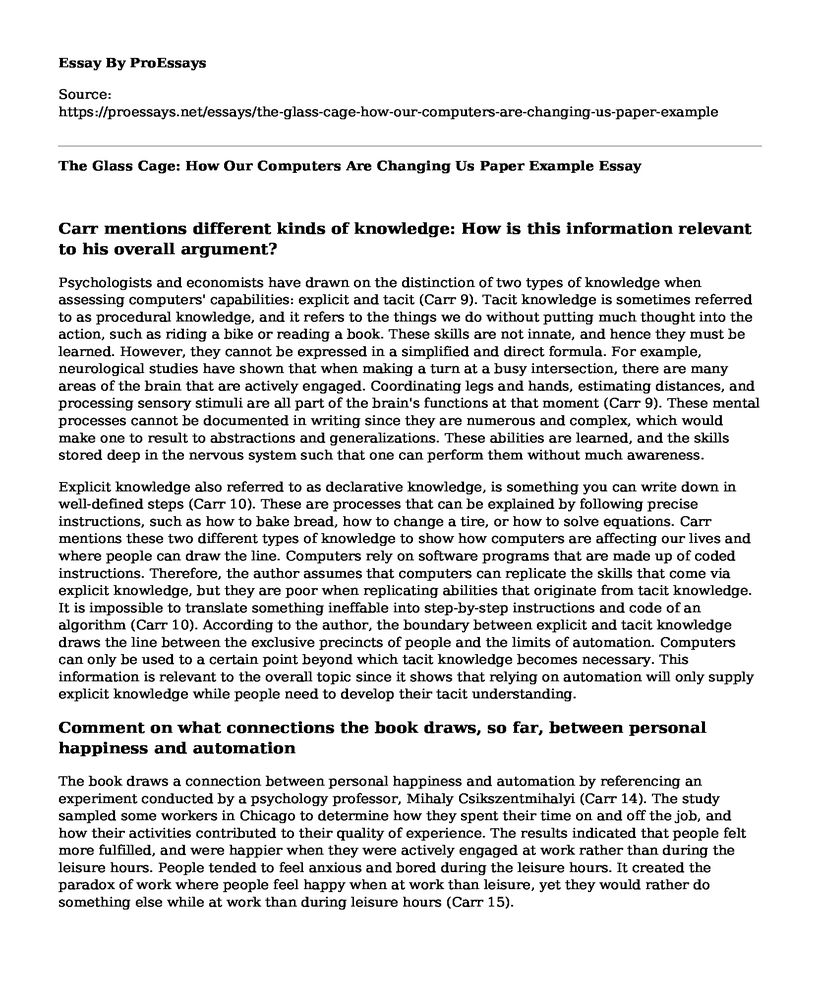Carr mentions different kinds of knowledge: How is this information relevant to his overall argument?
Psychologists and economists have drawn on the distinction of two types of knowledge when assessing computers' capabilities: explicit and tacit (Carr 9). Tacit knowledge is sometimes referred to as procedural knowledge, and it refers to the things we do without putting much thought into the action, such as riding a bike or reading a book. These skills are not innate, and hence they must be learned. However, they cannot be expressed in a simplified and direct formula. For example, neurological studies have shown that when making a turn at a busy intersection, there are many areas of the brain that are actively engaged. Coordinating legs and hands, estimating distances, and processing sensory stimuli are all part of the brain's functions at that moment (Carr 9). These mental processes cannot be documented in writing since they are numerous and complex, which would make one to result to abstractions and generalizations. These abilities are learned, and the skills stored deep in the nervous system such that one can perform them without much awareness.
Explicit knowledge also referred to as declarative knowledge, is something you can write down in well-defined steps (Carr 10). These are processes that can be explained by following precise instructions, such as how to bake bread, how to change a tire, or how to solve equations. Carr mentions these two different types of knowledge to show how computers are affecting our lives and where people can draw the line. Computers rely on software programs that are made up of coded instructions. Therefore, the author assumes that computers can replicate the skills that come via explicit knowledge, but they are poor when replicating abilities that originate from tacit knowledge. It is impossible to translate something ineffable into step-by-step instructions and code of an algorithm (Carr 10). According to the author, the boundary between explicit and tacit knowledge draws the line between the exclusive precincts of people and the limits of automation. Computers can only be used to a certain point beyond which tacit knowledge becomes necessary. This information is relevant to the overall topic since it shows that relying on automation will only supply explicit knowledge while people need to develop their tacit understanding.
Comment on what connections the book draws, so far, between personal happiness and automation
The book draws a connection between personal happiness and automation by referencing an experiment conducted by a psychology professor, Mihaly Csikszentmihalyi (Carr 14). The study sampled some workers in Chicago to determine how they spent their time on and off the job, and how their activities contributed to their quality of experience. The results indicated that people felt more fulfilled, and were happier when they were actively engaged at work rather than during the leisure hours. People tended to feel anxious and bored during the leisure hours. It created the paradox of work where people feel happy when at work than leisure, yet they would rather do something else while at work than during leisure hours (Carr 15).
Jobs impose a structure and discipline that is difficult to maintain if we are left to our own devices (Carr 16). A job forces people to engage in challenging tasks and finding solutions. These processes are satisfying since beating the deadlines and solving difficult tasks makes one feel important and happy. Jobs also end up improving people's skills and talents to new realms. The job environment is so immersive that people forget their daily worries and anxieties. However, when one is not actively involved in a job, their concentration tends to wander, and they long for the leisure hours. Individuals naturally shun work during leisure, and thus they get lazy, fretful, and bored (Carr 16). Given the opportunity, individuals will confine themselves to the idleness of leisure. This analysis ties in with the issue of automation. People are enamored by automation because it promises to make life comfortable, convenient and increase efficiency. As machines narrow people's responsibilities, they become less engaged and bored. At work, computers have taken over complex duties thus diminishing the thrill of challenging jobs and the happiness that comes with their accomplishment.
Work cited
Carr, Nicholas G. The Glass Cage: How Our Computers Are Changing Us. W. W. Norton, 2015.
Cite this page
The Glass Cage: How Our Computers Are Changing Us Paper Example. (2022, Aug 23). Retrieved from https://proessays.net/essays/the-glass-cage-how-our-computers-are-changing-us-paper-example
If you are the original author of this essay and no longer wish to have it published on the ProEssays website, please click below to request its removal:
- Documentary Analysis Essay on Secrets of the Mind
- The Tone and the Theme in Emily Dickinson's Poem "There's a Certain Slant of Light"
- Utilizing Kotter's 8-Step Model in Google Inc. Chinese Market Re-Entry Essay
- Essay Sample on Network File System
- Essay Sample on Memory Errors: Impact on Daily Life
- The Development of Ego and Id: A Psychoanalytic Perspective - Essay Sample
- Violent Video Games and How There is No Proven Link between Them and Increased Aggressive Behaviors - Free Paper







